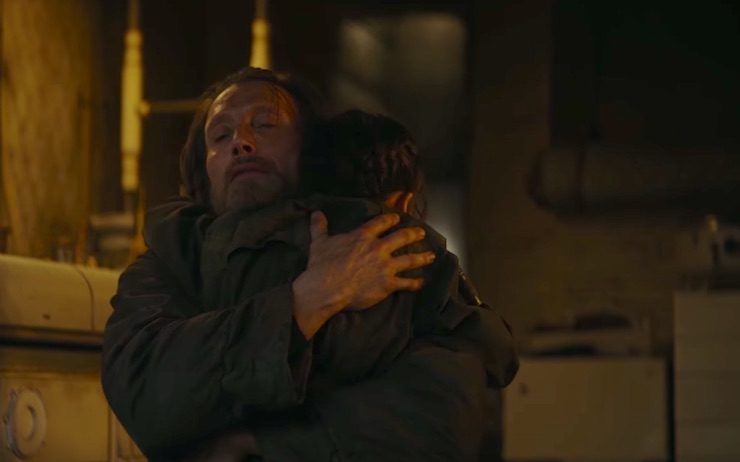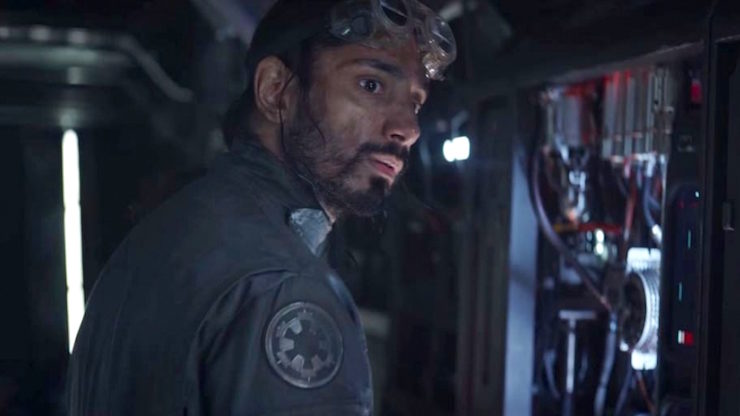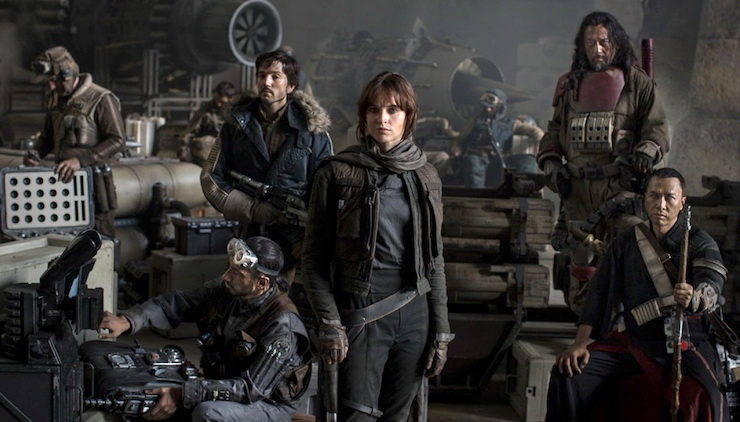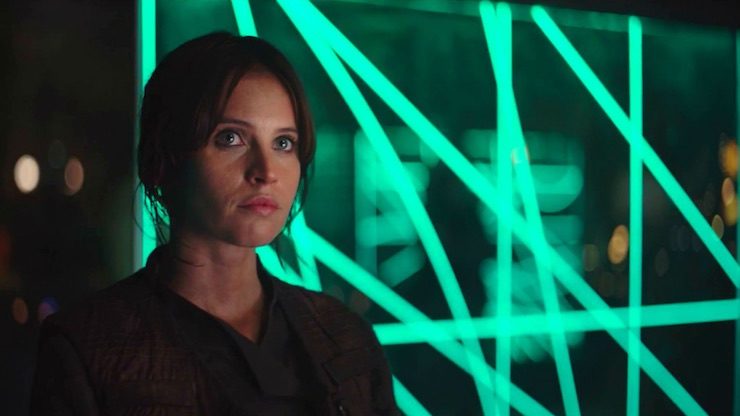Rogue One is possibly the most thematically chewy Star Wars movie so far. Whether you loved it, hated it, liked it but thought it needed fixing, or are simply pining for a prequel starring the best Gay Asian Space Uncles EVER, there’s a lot to digest. What I found most interesting, though, was the way that two characters can be seen as responsible for shaping not only the tactics of the Rebellion, but its entire character—as well as the price they paid for doing so.
First off, Sergeant Jyn Erso herself. The heart of Rogue One, Jyn is also one of the characters who has attracted the most controversy. There’s a legitimate reading of the movie that has her buried under a mountain of daddy issues. There’s another that paints her as entirely reactive and sees her emotional journey as truncated or unearned.
Truncated, I think, is fair. Unearned or unrealized? That I’d disagree with. Specifically, she has two lines of dialogue that clearly mark not only where she is on her emotional journey but signal a gear change for the movie itself. The first arrives during her conversation with Saw Gerrera on Jedha. His warning that “The world is coming undone. Imperial flags reign across the galaxy…” is followed by her retort:
“It’s not a problem if you don’t look up.”
That line hits like a slap to the face. This is Jyn not as a rebel, a criminal, or the daughter of Galen Erso. This is Jyn as every Republic citizen who turns away when they see white armour, or who doesn’t react when their neighbour is arrested in the middle of the night. This is Jyn as one of us. And the film is brave enough to show us the reality that we’re often too frightened or too worn down to make a stand when we should.
The line also demonstrates that she’s at the start of her emotional arc even as she, and the film, take a massive leap forward once the message from Galen is revealed. If the first act is Jyn being pressed into service against her will, the second act sees her suddenly running headlong into service while Cassian mutters something about how they need to be careful and she disappears into the middle distance.
That all-consuming need she feels to rescue her father and the family reputation is, in turn, tied to her own desire to be free. Jyn has lived in horror for at least a decade at this point and she’s motivated as much to make those feelings stop as she is to save Galen. That goes a long way towards helping us understand why she’s so unconcerned with everything other than her father. It’s not just that he’s family, or that he may not be the villain he seems to be. It’s that Jyn is still the terrified little girl who watched her mother die and her father disappear and she’d REALLY like to move on. Her state of mind at this point in the film strongly reminded me of classic Buffy episode “Normal Again,” in which Buffy grapples with similar issues. There’s the same desperate need to move on but as we see, Jyn’s freedom comes with more certainty than Buffy’s—but at a heavier price.

It’s also worth noting that at this point, she’s with the Rebellion but not part of it. That changes on Eadu. There, Cassian Andor—who, like the rest of the main characters, deserves an essay to himself—is all set to assassinate Galen from a safe distance. It’s a perfect opportunity to hobble the Death Star Project and it makes absolute sense to do it. Jyn, by contrast, climbs a mountain-sized ladder and sneaks, alone, into an Imperial compound convinced that she can somehow find and save her dad. That’s a tactical play straight out of the same book as “Ride my feathery lizard into certain death” and “Improvise an assault on a heavily armed and armoured bunker aided only by a small group of Rebel commandos and a large tribe of almost certainly cannibalistic teddy bears.”
In other words, Jyn is a Rebel before the Rebellion itself truly comes into its own. And the fact that Cassian, broken by years of killing in the name of those who he desperately hopes are the good guys, doesn’t shoot Galen speaks to the power such an approach can have. Jyn leads by example, especially when that example is tactically unsound but morally right.
Which leads us to her second pivotal line:
“You give way to an enemy this evil with this much power and you condemn the galaxy to an eternity of submission.”
This statement is a world away from “It’s not a problem if you don’t look up.” She’s no longer looking for her dad, or mourning her stolen years. She’s free, not just of her father’s shadow, but of the caution and constraints that prevent Mon Mothma, Bail Organa, and the rest from acting.
She is, literally and metaphorically, a rebel: outside the command structure, alone aside from the friends she’s accrued by accident rather than design, and at absolute peace with the fact that what she has to do is also almost certainly the last thing she will ever do. That’s why Cassian and his team of broken toy soldiers join her, and why Baze and Chirrut stay with her. Jyn isn’t concerned with what should be done. She’s focused on doing what’s right. For these men and women, trapped in the moral grey area of a cold war that’s fast becoming hot, that’s less a light at the end of the tunnel than it is the standard they’ve desperately needed to rally around.
Better still, this puts Jyn absolutely in line with every other Star Wars protagonist: General Leia, Rey, Luke, Han, Finn, Poe. They’re all people who will put the greater good above their own welfare, all people with a healthy disrespect for authority and a fondness for making up plans on the fly. Like Jyn herself says, they’re all rebels. And they all start with her.
Her, and Bodhi Rook.

Where Jyn’s determination and distrust of the system is the catalyst for Rogue One‘s first and last official mission, it’s Bodhi who provides the moral counterpoint to that. Like Jyn, he’s grown up under the Empire. Like her, he’s made the best of it, just like many of us would. Stay out of trouble, help people when you can, take a job, keep your head down.
Don’t look up.
Until he doesn’t have a choice.
We don’t see the moment in which Bodhi looks up but we do see the consequences of that moment. His almost impossibly brave decision to defect is one the film spends much of its running time punishing him for. Tortured, interrogated, and almost psychologically broken, Bodhi’s reward for doing the right thing is to be placed in constant danger and mistrusted by everyone.
It doesn’t matter. Just like Jyn, he’s driven to keep going. But where Jyn lives in the shadow of her father, Bodhi is aided in his escape by Galen. In many ways, Bodhi’s escape is the expression of Galen’s own horror at the project. Bodhi is the person he can save in the hope that Bodhi and Jyn will save everyone else. The fact that Bodhi is an Everyman just adds weight to his own persistent acts of courage. It’s especially notable that the one time he kills “fellow” Imperial staff, on Eadu, he’s visibly troubled by it. Bodhi’s a good man and, much like Cassian and his list of victims for the “greater good,” that has a price.
But it’s one of Bodhi’s last actions that has the greatest emotional impact. Make no mistake, pretty much the entire final act of Rogue One is a tearjerker marathon, but one of the scenes that hits the hardest is all Bodhi. Preparing to lift off for the Scarif raid, Yavin IV traffic control demand a call sign for the team’s stolen Imperial cargo shuttle. A panicked Bodhi is at a loss for words until Jyn encourages him, he visibly calms and gives them the call sign that gives the movie its title:
“It’s Rogue…Rogue One.”
It’s difficult to count all the ways this moment resonates. That Bodhi is played by Riz Ahmed, the son of Pakistani immigrants to the UK, is the most immediate. Heroes can look like anyone. Heroes DO look like anyone, and this is the first Star Wars movie in the history of the franchise to date that’s really shown that. Along with fellow cast members Donny Yen, Jiang Wen, and Diego Luna, he’s a long overdue embodiment of how diversity and representation can not only make stories different but make them better. Bodhi, Ahmed, and their colleagues are the embodiment of progress that’s necessary, long overdue, incomplete but, finally, in motion.

Then there’s the proud relevance of the code name and the retroactive blueprint for Rebel military tactics (do something stupid and impossible! Break all the things! Leg it!) that the raid provides. At this point in the Rebel’s existence, “going rogue” is a crime. After Scarif, it’s a badge of honor.
This moment is also his equivalent of Jyn seeing her father’s message on Scarif. Bodhi is at peace with what he has to do here on out, although it’s interesting to note that pacifism seems to still be part of his world view. He takes great pains to not kill anyone on Scarif even though that ends up costing him his life. The fact that his moral choices make little difference in the ultimate outcome is also interesting. It doesn’t mean his actions and sacrifice are meaningless—if anything, it gives them even more weight.
But the consequence of this moment that hits the hardest is the one we don’t see. That the Rebel Alliance’s most fearsome, most respected squadron of fighter pilots is formed to honor both Jyn’s team and the name Bodhi chose. The greatest pilots in Rebel history (Poe would come later, of course), flying under a banner given to them by an Imperial deserter who sacrificed his life to give them a chance.
The Death Star plans may be at the center of the narrative but the heart of Rogue One’s symbolic story is the birth of the Rebel Alliance. An alliance defined by, more than anything else, the actions and beliefs of a war orphan and a defector who lay down their lives for a chance at a better world. That, just as much as the Death Star plans, is the hope Rogue One delivers.
This article was originally published January 2017.
Alasdair Stuart is a freelancer writer, RPG writer and podcaster. He owns Escape Artists, who publish the short fiction podcasts Escape Pod, Pseudopod, Podcastle, Cast of Wonders, and the magazine Mothership Zeta. He blogs enthusiastically about pop culture, cooking and exercise at Alasdairstuart.com, and tweets @AlasdairStuart.










